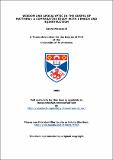Wisdom and apocalyptic in the Gospel of Matthew : a comparative study with 1 Enoch and 4QInstruction
Abstract
Recent scholarship has demonstrated that Matthew's gospel has significantly developed
both sapiential and apocalyptic elements within its narrative. Little attention has been paid,
however, to the question of how these two features of Matthew's gospel might relate to one
another. It is this gap in scholarly literature that the present study is intended to fill, by means of a
comparative study with two other texts of mixed genre: 1 Enoch and 4Qlnstruction.
An examination of these texts demonstrates that each is marked by an inaugurated
eschatology, within which the revealing of wisdom to an elect group, defined in distinction to the
Jewish parent group, serves as the pivotal moment of inauguration. In addition, within
4Qlnstruction the idea is developed that possession of this revealed wisdom allows the remnant
to live in fidelity to the will of the Creator and to the patterns built-in to the original creation.
Thus, possession of revealed wisdom facilitates a recovery of creation.
These findings provide lines of enquiry that may be brought to Matthew. Three sections
of the gospel are examined (chapters 5-7; 11-12; 24-25). It is argued that Jesus is presented as an
eschatological figure who reveals wisdom to an elect group. This wisdom cannot be reduced to
great moral insight or interpretation of Torah, but is presented as prophetic revelation, happening
in eschatological time. It remains the case, however, that Matthew presents it as wisdom and
presents Jesus as a sage.
More tentatively, it is suggested that creation provides the patterns for the ethical
requirements of Jesus' wisdom, thus indicating that the idea of restored creation is also at work in
Matthew. The fall of the temple may also be connected in Matthew's narrative to such a
restoration, but again, the evidence for this is not clear.
Type
Thesis, PhD Doctor of Philosophy
Collections
Items in the St Andrews Research Repository are protected by copyright, with all rights reserved, unless otherwise indicated.

